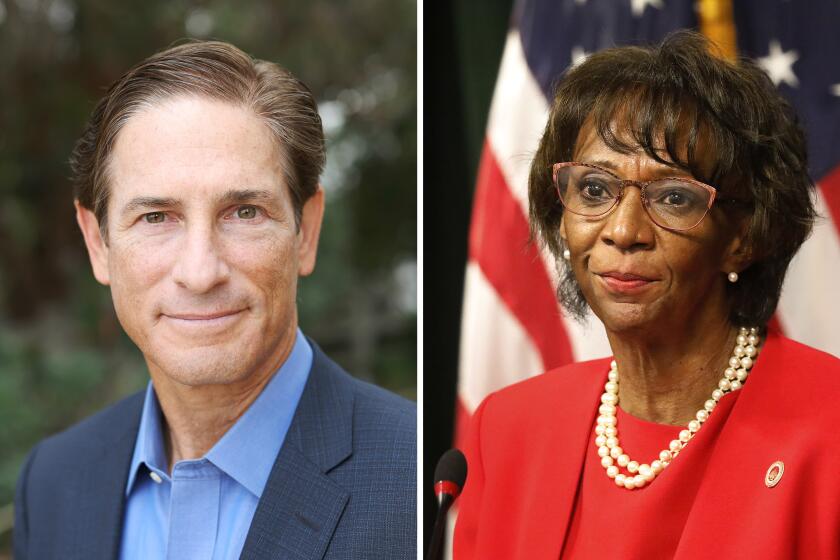Charter Panel Chiefs Reach Key Accord
With one last flurry of activity and compromise, the two commissions overhauling Los Angeles’ City Charter wrapped up a key phase of their work this week, and leaders of both panels emerged Friday with a deal to iron out the remaining differences between them.
“We’re very pleased that we’ve reached agreement,” appointed commission Chairman George Kieffer said.
Kieffer and elected Chairman Erwin Chemerinsky negotiated the final elements of their proposed compromise and alerted their fellow commissioners to their agreement so that a special conference committee can take the matter up Monday. Approval by the conference committee is just a first step, however, because the package will need to win the backing of both full commissions for it to be submitted to voters as a unified recommendation. The outcome of that process is difficult to anticipate, especially at the elected commission.
“I’ve taken this so much one step at a time,” Chemerinsky said Friday, declining to guess how his commission would vote. “I don’t have any predictions.”
Both chairmen predicted, though, that the conference committee would approve the package, which includes compromises on the size of the City Council, the authority to be given to the Police Department’s inspector general and the inclusion of language guaranteeing city contractors’ employees a living wage.
The compromise package already has picked up a handful of influential endorsements. City Administrative Officer Keith Comrie said Thursday that he believes the compromise, if passed, will result in a more efficient and fair government. Former City Councilman Marvin Braude hailed the effort as a monumental achievement.
Others are more skeptical. Joined by some council members, Mayor Richard Riordan has criticized some of the compromise proposals as doing too little to encourage accountability in government and he has urged elected commissioners to reject it.
Meanwhile, for every issue that is resolved, more keep cropping up. Late Thursday, elected commissioners approved a proposal to significantly expand the number of senior city officials who can be fired without cause--a move that could antagonize labor but Riordan considers a vital reform--as well as one to extend benefits to domestic partners of all city workers.
The latter proposal won unanimous support from the elected panel, whose members touted it as a matter of basic human rights. But it could run afoul of some appointed commissioners, who generally have shied away from tackling broad social issues in their proposed charter.
The move to expand the number of so-called exempt positions, jobs that are exempt from Civil Service protections, came over the objections of some labor representatives but after sustained lobbying by Riordan. Earlier in his tenure, the mayor attempted to add exempt positions and won support for a charter amendment intended to do that.
A drafting error in that amendment, however, resulted in it having the opposite effect, so Riordan urged charter commissioners to undo that mistake as part of their deliberations on a new city constitution.
On Thursday, commissioners approved adding potentially hundreds of exempt positions. A 10-2 majority of the elected panel voted to exempt all second- and third-tier deputies of city departments. In addition, the council and mayor could agree to add more, up to 1% of the city work force. That would be more than 400 spots, compared with a limit now of about 165 positions.
Only Commissioners Dennis Zine and Bennett Kayser voted against the proposal to add exempt positions. They are two of the most loyal labor votes on the commission.
Although the debate over how many positions to eliminate from Civil Service may test the commission’s labor backing, other aspects of the proposed charter enjoy strong support among workers. Last week, the elected commission voted to include language in its proposal guaranteeing living wages to all employees of companies that contract with the city.
And on Thursday, the panel unanimously backed a measure to extend benefits to partners of gay and lesbian city workers, as well as a companion proposal to restrict the city from contracting with companies that do not provide such benefits.
Both the domestic partner and living wage provisions are enthusiastically backed by the elected commission, whose members championed the measure Thursday both for its symbolic value as a statement of human rights and for its potential political value of turning out gays and lesbians to vote for the revised charter.
Initially, Commissioner Richard Macias warned that it also might galvanize opposition to the charter among some conservatives. The panel’s most conservative member, Paula Boland, was not present for Thursday night’s debate, but she has raised similar points on other charter proposals that raise social issues. But after the matter was roundly debated, Macias backed down.
Contrasted with the elected commission’s unanimity on that topic is skepticism from the appointed commission. In order to compromise, Kieffer has agreed to recommend that his fellow commissioners adopt language about the living wage, but he was guarded about endorsing a compromise on domestic partner benefits.
Assuming that the conference committee wraps up its work Monday, the next step will be for the two commissions to consider the compromise package. Both panels have scheduled meetings for early January.
More to Read
Start your day right
Sign up for Essential California for news, features and recommendations from the L.A. Times and beyond in your inbox six days a week.
You may occasionally receive promotional content from the Los Angeles Times.






